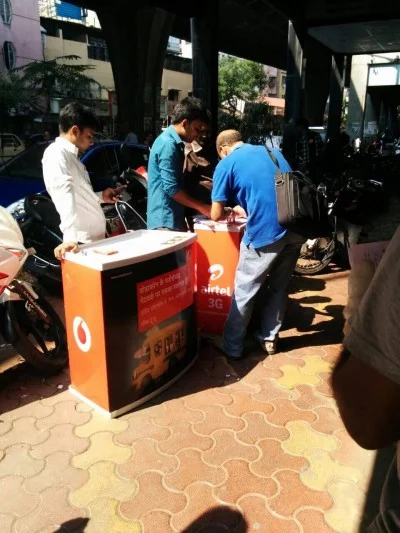 The Reserve Bank of India has issued final guidelines for companies seeking to set up payment banks and small finance banks in a bid to expand banking services to more people and small businesses.
The Reserve Bank of India has issued final guidelines for companies seeking to set up payment banks and small finance banks in a bid to expand banking services to more people and small businesses.
Going ahead, Crisil Research said in a research note that telecom operators are the ideal candidates to set these up, given their significant customer base in rural areas and well-entrenched distribution networks.
There is a strong business case for payments banks in India because a sizeable portion of the country's population remains outside the ambit of formal banking. However, telecom service providers are already offering mobile wallet (m-wallet) services for remittances. The value of transactions through m-wallet has more than tripled in the last two years to over Rs 27 billion (Rs2,700 crore) in the last fiscal, indicating the huge business potential.
Setting up a payments bank also makes strategic sense for telecom operators as it would help them improve the 'connect' with customers and also, over a period of time, obtain a greater share of their wallet, Crisil said in a note.
In the meantime, telecom operators are likely to capture around 15 per cent of the domestic remittances market by then, luring deposits is another ball game altogether because they will have to invest in brand building and gain the trust of depositors.
"The payments banks will have a minuscule share of less than 0.5 per cent of the current and savings account (CASA) deposits of the Indian banking system five years after launch,” according to Crisil.
Yet, it expects telecom operators to be interested in a payments bank licence because of the opportunity it offers to increase customer touch points apart from potential upsides to revenue in the long term.
"The other aspirants for a licence, we believe, will be India Post, large business-correspondent companies, and pre-paid payment instrument providers.
"But all of them will have to incur a much higher cost – compared with telecom operators – to set up competitive distribution networks and gain customers," the ratings agency said in a statement.
Telcos already offer mobile wallet
M-Pesa, started in April 2013 by Vodafone India, has more than 60,000 outlets in the country. Airtel Money, provided by Bharti Airtel,Idea Cellular, Tata Teleservices and Aircel, for instance, with a pan-India presence.
On the other hand, regional telecom firms such as Uninor and Sistema Shyam Teleservices are also studying the possibilities in their circles.
Telecom operators have presence across majority of the six lakh villages in the country, with presence to sell cards and services. The country has already issued 650 million Aadhaar cards, a possible verification document in these villages.
New norms for payments banks
Under the new norms for payments banks, the minimum paid-up equity capital is Rs 100 crore and the leverage ratio should not be less than 3 percent. Liabilities must not exceed net worth by 33.3x and the promoters must hold 40 percent of equity for the first 5 years.
Payments banks can accept deposits and remittances but cannot provide loans. Small finance banks are aimed at lending to “unserved and underserved sections including small business units”, the Reserve Bank of India (RBI) said.
Eligibility criteria
RBI has explained the eligibility criteria, the central bank has included non-bank prepaid card issuer, mobile companies, telecom companies, business correspondents, PSU companies, real sector cooperatives and supermarket chains as promoters of payments banks, while it has allowed NBFCs, MFIs and local area banks to convert to small banks.
Application process Applications for these new kind of banks will be accepted till 16 January, but the central bank also plans to issue them on tap soon. Applications will be screened by a external advisory committee comprising of bankers, chartered accountants, finance professionals.
“The validity of the in-principle approval issued by the Reserve Bank will be eighteen months. The names of applicants for bank licences will be placed on the Reserve Bank’s website,” the central bank said.
Success nation
Mobile payment technologies have proved highly successful in developing markets such as Kenya, where Vodafone’s M-Pesa service is used as a virtual currency by more than 70 per cent of adults, allowing users to store money, transfer funds to relatives or buy products in shops.















